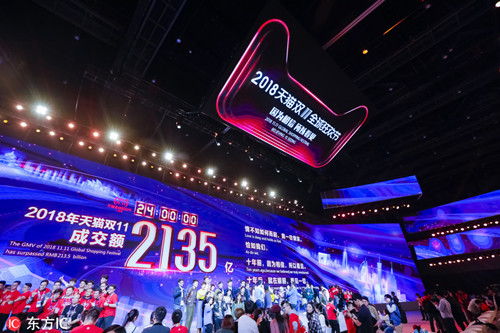Singles Day enlivens overseas commerce


A screen shows that sales on Alibaba's online marketplace Tmall during the annual Singles Day shopping spree hit 213.5 billion yuan ($30.7 billion) on Sunday, with full-day sales setting a new high. [Photo by Gao Erqiang/China Daily]
Overseas retailers racked up big sales on Alibaba's Singles Day shopping festival. The e-commerce giant said 3,700 categories representing 180,000 overseas brands from 75 countries and regions were featured during the shopping extravaganza.
"Double Eleven is a feast for global consumers, and Chinese consumers' demand for overseas goods is increasing rapidly, so global merchants are actively participating," said Wei Chen, deputy general manager of Tmall International, Alibaba's online retailer.
The ongoing trade dispute with China did not deter US merchants from participating, with more than 10,000 of those brands hailing from the United States.
The US ranked second, after Japan, in gross merchandise volume among countries and regions selling to China.
William Zhao, head of Asia markets at Tmall's Import & Export Department, said maternal and children’s products and cosmetics and electronics made in Japan were the best-selling imports on Tmall on Singles Day.
"Japanese merchants dominated not just Singles Day but also our sales over the year. They achieved the largest scale since 2017 and are still growing at a tremendous speed," Zhao said.
Many US brands joined this year's festival for the first time. Foot Locker Inc, one of the largest sportswear and footwear retailers in the United States, debuted its online store on Tmall.
Doreen Wang, global head of BrandZ at Kantar Millward Brown, said she was not aware of any US brands changing or adjusting their strategies for Singles Day because of the tariff standoff.
"It's the biggest shopping festival in the world, and it's a very important presentation opportunity for all brands,” said Wang, who works for the largest brand-equity database worldwide, which covers 10,000 brands across 43 countries.
"Double Eleven is far more than a promotion campaign. For brand owners, it's more important to enhance customers' brand experiences, to turn those consumers into loyal consumers, which is more profitable," she said.
Wang said she believes that the US brands "will still focus on the needs of Chinese consumers".
"If you win in China, you win the world," she added.
While US sellers have seen good results from their participation this year, data from the festival show that US shoppers are also in the mood to buy Chinese products. Consumers from 200 countries and regions placed orders on Tmall.com, and US buyers made large contributions to those sales.
Tmall's Zhao said Japanese online sales have grown in China because a significant number of small and medium-sized companies in Japan entered the arena and competed for shares because of increasing confidence in Chinese markets.
"For example, MTG, which makes ReFa, a facial roller (a type of massager) is competing with other products from Panasonic, which used to dominate the market in China," Zhao said, "and I have to say that their performance is quite good," he added.
Teruo Omori, team manager of MTG's global business division in Nagoya, said he is very pleased to learn of the favorable performance of their products in China.
"I have a vivid feeling that our brand is getting more recognition in China. The Chinese market is our strategic priority in the future and we are expecting more gains from it," Omori said.
Alibaba celebrated the 10th year of its"11/11" shopping gala on Sunday in Shanghai. During the 24-hour period, Alibaba sales soared past $30.8 billion, hitting another record high by breaking last year’s total Singles Day sales of $24.22 billion, with 27 percent year-on-year growth.
Contact the writers at xiaohong@chinadailyusa.com
MOST POPULAR
- 1 $39.7 billion worth of deals inked at Airshow China
- 2 China announces tax relief measures to stabilize real estate sector
- 3 A look at China's economy in October, 2024
- 4 Public holiday extension announced
- 5 China's NEV annual production hits 10 million milestone amid global carbon reduction efforts
Editors' Picks
 Infographic:
Golden jubilee of China-Brazil relations
Infographic:
Golden jubilee of China-Brazil relations
 Infographic:
A look at China's economy in October, 2024
Infographic:
A look at China's economy in October, 2024
 Infographic:
G20 at a glance
Infographic:
G20 at a glance
 Video:
Peru sees new port open
Video:
Peru sees new port open



